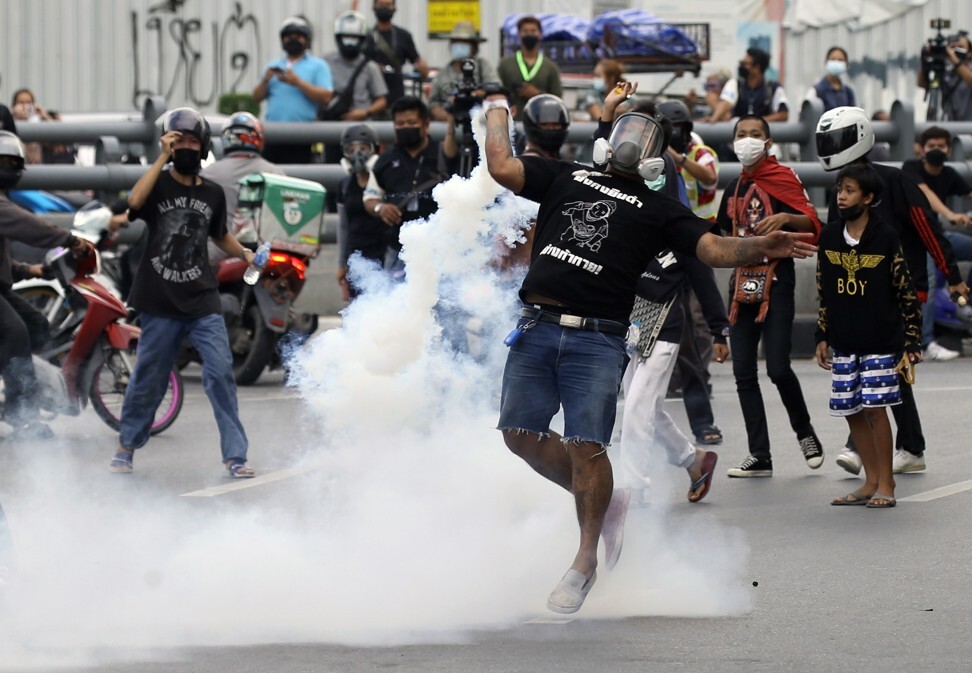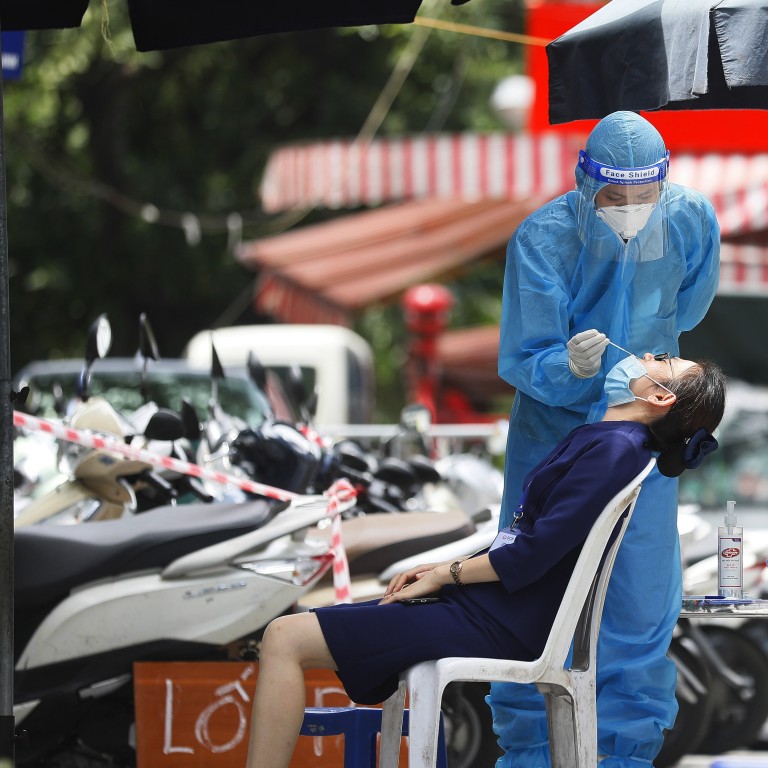
Coronavirus: Vietnam bans people from leaving their homes as deaths jump; New Zealand extends lockdown
- The government said it will deploy the military to enforce the lockdown in Ho Chi Minh City and deliver food supplies to citizens
- Elsewhere, the Philippines relaxes restrictions in the capital region even as cases rise, while Thailand hits 1 million infections
Vietnam’s toughest order yet comes amid a spike in fatalities and infections, despite weeks of lockdown measures in the business hub of 9 million people, the epicentre of the country’s deadliest outbreak.
“We are asking people to stay where you are, not to go outside. Each home, company, factory should be an antivirus fort,” Pham Duc Hai, deputy head of the city’s coronavirus authority, said on Friday.
The government said it was preparing to mobilise police and military to enforce the lockdown and deliver food supplies to citizens.
Police with loudspeakers were seen driving around residential areas on Friday instructing people to follow protocols and assuring them food supplies would be provided.
The defence ministry plans to send 1,000 military medics and medical equipment over the weekend, according to a military document reviewed by Reuters.
Covid-19 is eating into export-dependent Vietnam’s food and agriculture sector
The government also extended restrictions on Friday in the capital Hanoi by a further 15 days, state media reported.
News of the worsening coronavirus crisis hit Vietnam shares on Friday, with its benchmark index closing down 3.3 per cent.
Vietnam has been slow to procure vaccines and until late April had one of the world’s best containment records, with 35 deaths and just over 2,900 cases as of May 1.
But that has since jumped to over 322,000 cases and 7,540 deaths, with about half of the infections and 80 per cent of fatalities in Ho Chi Minh City alone.
“If you fail to test them all within the next two weeks, it would be your fault,” he told health minister Nguyen Thanh Long at the meeting, according to state broadcaster VTV.
New Zealand extends lockdown
New Zealand Prime Minister Jacinda Ardern on Friday extended a Covid-19 lockdown as the country’s Delta outbreak widened beyond its largest city, Auckland, to the capital, Wellington.
The caseload from the latest outbreak rose to 31 with 11 new cases on Friday, prompting Ardern to extend the lockdown until 11.59pm on August 24.
Will Covid-19 become more infectious with more variants emerging?
“We just don’t quite know the full scale of this Delta outbreak,” Ardern said. “We want the whole country on high alert right now.”
Ardern said her government’s elimination strategy was “tried and true”.
“We have been here before ... we know the elimination strategy works,” Ardern said. “Cases rise and then they fall until we have none. We just need to stick it out.”
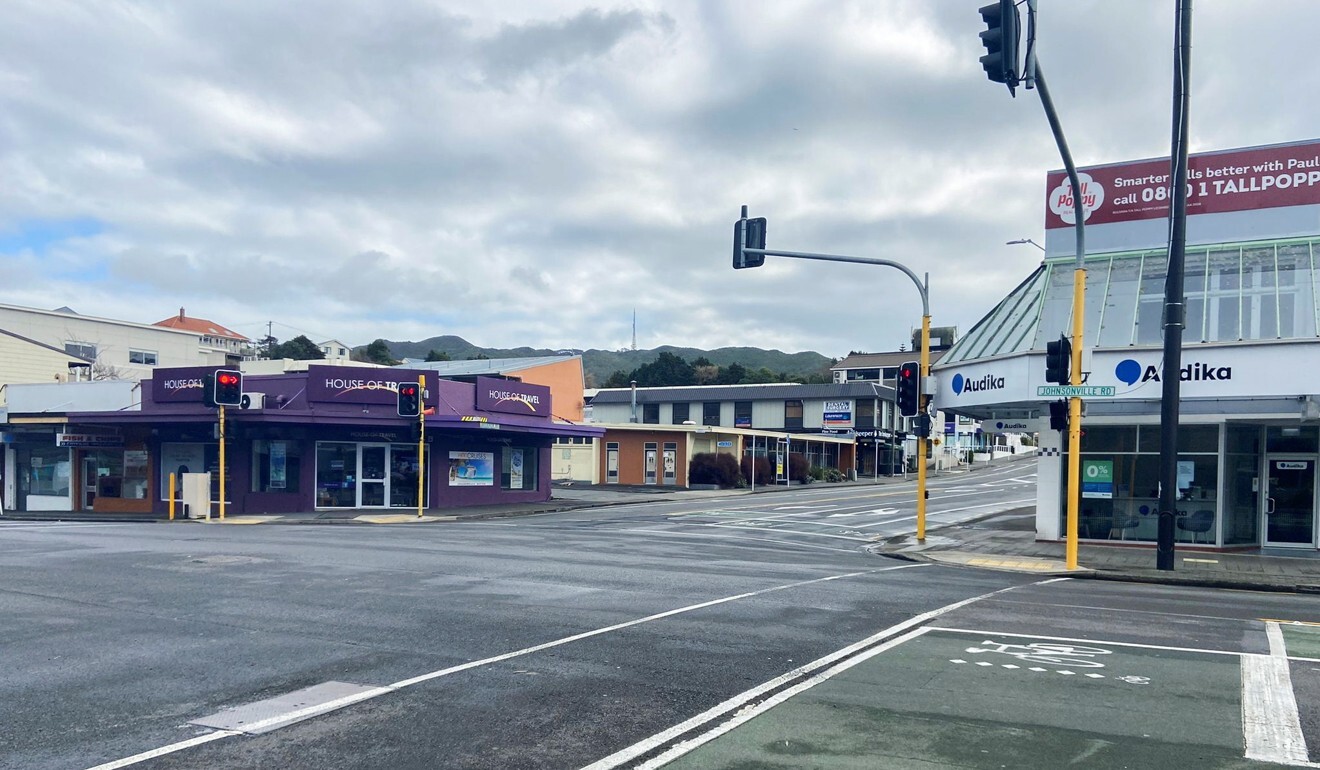
The New Zealand outbreak has been traced back to a traveller who returned from Sydney earlier this month, although it remains unclear how the virus jumped quarantine containment into the community.
About 19 per cent of New Zealand’s 5 million residents have been fully vaccinated, the slowest among OECD nations.
Australian states urge rule compliance
New South Wales (NSW) residents must now also wear masks when going out and face limits on outdoor exercise, as the state reported its third consecutive day of more than 600 new infections.
NSW Premier Gladys Berejiklian said she had tightened restrictions also because some people continued to flout lockdown rules.
“I asked health and police to work together, to give me a final list of what we can throw at this, to leave no shadow of a doubt as to how serious we are about getting … case numbers down,” she said.
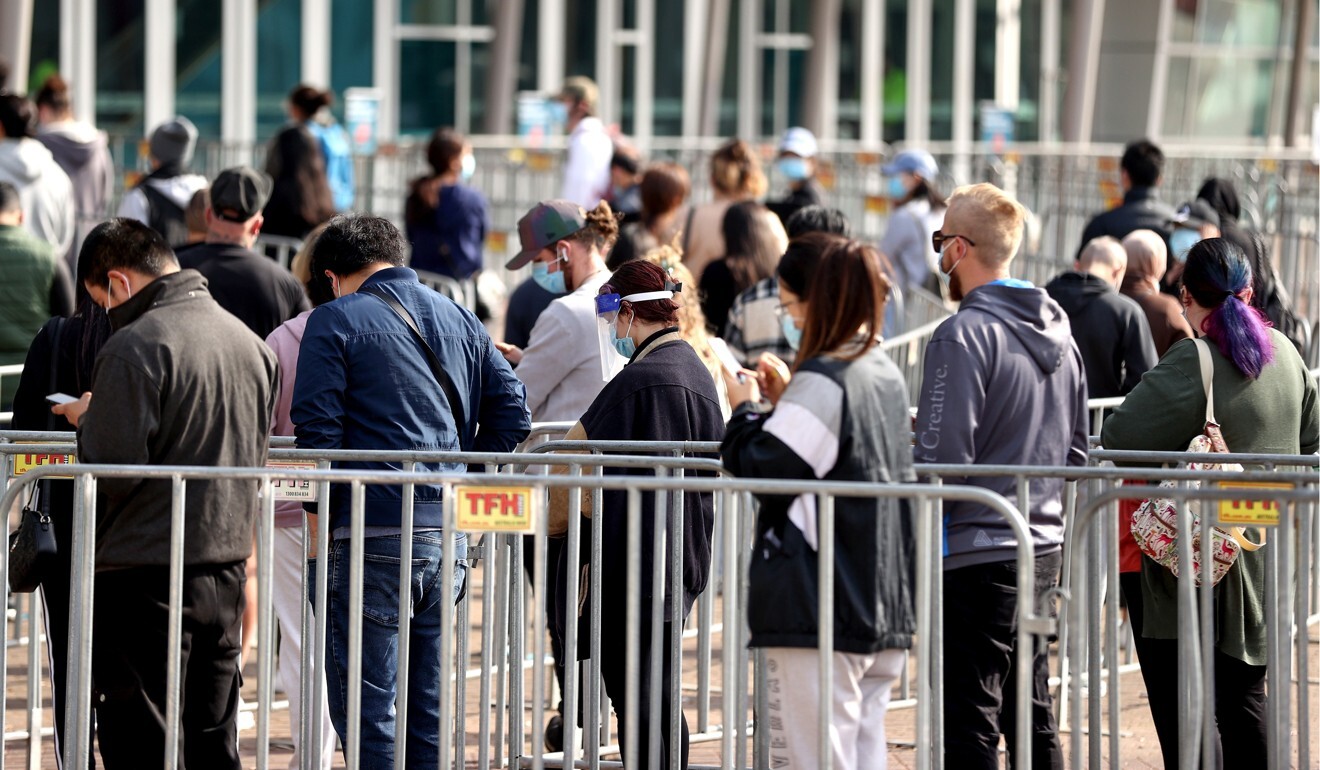
In Victoria state, Premier Daniel Andrews urged residents to stick to the already escalated Covid-19 rules or face even harsher restrictions, after 55 new cases were recorded.
“I cannot stress enough how close to the edge we are,” he said in a press conference. “If we don’t all make good choices this weekend, then we are not going to be reporting 50 cases, we will be recording a lot more than that. And that’s not good for anybody.”
Australia is struggling to contain a Delta outbreak, a sharp turnaround for a country which had experienced only sporadic flare-ups for several months this year.
Sydney’s lockdown has hit the vulnerable harder than the wealthy
Federal Treasurer Josh Frydenberg on Friday told media “nobody should be under any illusion that we can eliminate Covid – we can’t”.
“We can’t be in a permanent state of lockdown. What we have to do is be honest with the public, that by living with Covid there will be cases, there’ll be people in hospital, there’ll be deaths,” he said.
“But at the same time, getting higher levels of vaccination reduces the likelihood lockdowns will be required and that people who get vaccinated will get sick.”
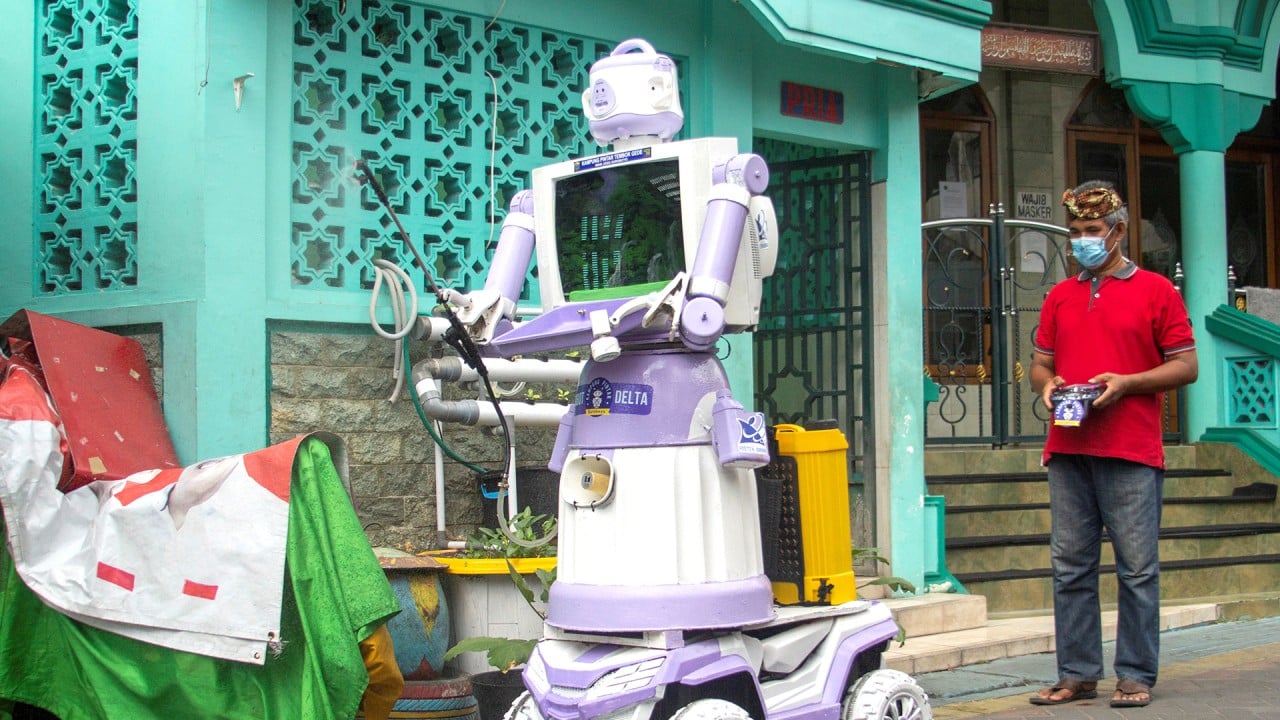
02:51
Indonesian city turns household trash into a cheerful Covid-19 robot helper
Philippines eases curbs even as cases rise
Metro Manila, with a population of more than 13 million, will be placed under the second-strictest level of restrictions from August 21 to 31, after being on tight lockdown since August 6, presidential spokesperson Harry Roque said.
Philippines finds first case of Covid-19 Lambda variant
The less-strict community quarantine protocol allows higher operating capacity for businesses including on-site operations, but still prohibits indoor and alfresco dining services, religious gatherings and personal care services.
“These reclassifications are without prejudice to the imposition of localised or granular lockdowns in critical areas,” Roque said.
“The members of the [coronavirus task force] have decided that we all need to be strategic … in our responses to control the further spread of Covid-19 and its variants,” he said. “Community quarantine is not the only solution to the pandemic.”
The Philippine health ministry on Friday reported 17,231 new coronavirus infections, a record-high daily increase in cases.
It said total confirmed cases in the country have increased to more than 1.8 million, while deaths have reached 31,198, after 317 fatalities were recorded on Friday.
Thailand hits 1 million cases
Thailand passed the 1 million mark in coronavirus cases on Friday, 97 per cent of which were recorded in the past five months, as the country struggles to get on top of one of Asia’s most severe outbreaks.
Authorities on Friday reported 19,851 cases and 240 fatalities, taking total confirmed infections past 1 million and deaths to 8,826.
Thailand had kept the coronavirus largely under control and enjoyed only partial social restrictions for much of the pandemic until it was hit in April by the virulent Alpha variant, followed later by the Delta variant, at a time when few people were vaccinated.
Thousands join protests in Bangkok to demand PM’s resignation
Health officials have been rushing to shore up vaccine supply having inoculated just 8.3 per cent of its population of more than 66 million.
Authorities are also mixing AstraZeneca and Sinovac shots to boost immunity and as a workaround for supply issues.
The government’s handling of the coronavirus crisis, including its vaccination policy, has fuelled a recent revival of protests against Prime Minister Prayuth Chan-ocha, who has stood by his administration’s strategy.
Malaysia relaxes rules for fully jabbed residents
Malaysia expanded freedoms for those fully vaccinated on Friday, allowing them to dine in at eateries and visit night markets despite record high daily infections. More businesses have been allowed to reopen as authorities this month begun to ease restrictions after nearly three months of lockdown. It’s widely viewed as a flip-flop in policies to tackle the pandemic.
Daily cases in Malaysia hit 23,564 on Friday, more than doubled since a lockdown began on June 1. The country’s total infections have surged to over 1.5 million while 13,000 people have died. Caretaker leader Muhyiddin Yassin also said picnics, camping and non-contact sports are allowed for those fully vaccinated. He said the decision was made as over half of Malaysia’s adult population have been fully inoculated. Some eateries reportedly voiced concern due to high daily virus cases. The Malaysian Medical Association also said authorities should focus on ramping up vaccination to cover at least 80 per cent of the adult population.
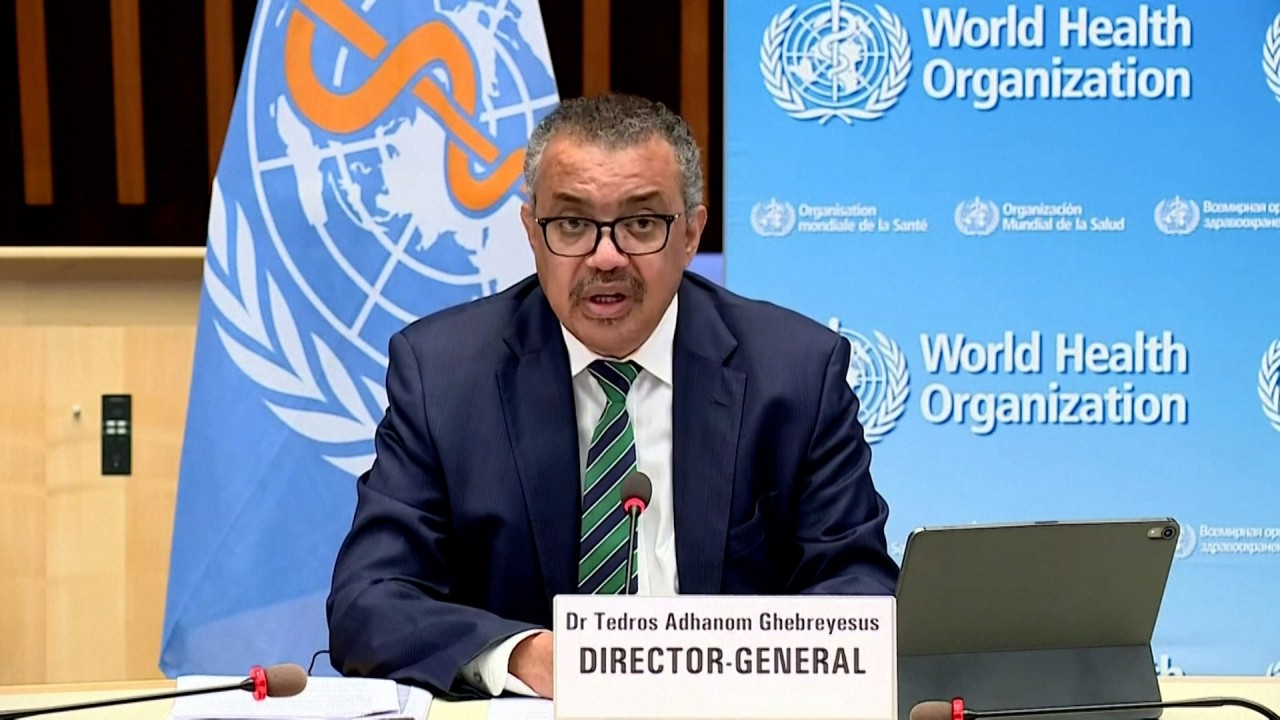
01:50
WHO says no need for Covid-19 booster shots for now since vaccine supplies are low
South Korea to continue distancing measures
The South Korean government has extended social distancing curbs for two weeks while allowing vaccinated people some latitude.
The country’s fourth coronavirus wave has shown few signs of abating six weeks after the toughest Level 4 distancing rules, which include a ban on gatherings of more than two people after 6pm, were imposed in the greater Seoul area.
South Korea reported 2,052 new cases on Thursday, 2,001 of which were locally acquired, health officials said.
Will South Korea’s Covid-19 vaccines become as important as its semiconductors?
As part of the extended restrictions, authorities will require restaurants and cafes in the metropolitan area to close an hour earlier at 9pm until September 5, Prime Minister Kim Boo-kyum told a coronavirus response meeting.
South Korea has registered a total caseload of 232,859 infections, with 2,197 deaths.
Reporting by AP, Reuters, dpa, AFP

